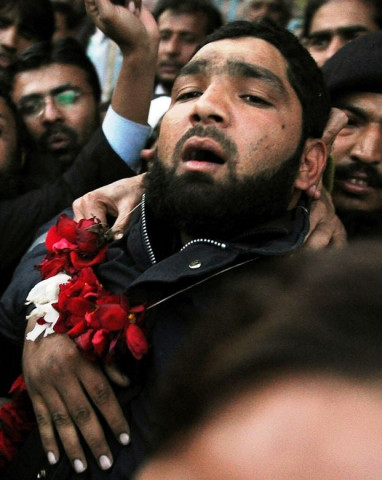‘Blasphemy’ killing: Top court upholds death sentence of Taseer’s assassin
Also restores Mumtaz Qadri’s terrorism conviction

Also restores Mumtaz Qadri’s terrorism conviction. PHOTO: AFP
The Supreme Court on Tuesday upheld the death sentence for Malik Mumtaz Qadri, a former police guard who had assassinated former Punjab governor Salmaan Taseer on January 4, 2011 outside his residence adjacent to an upscale market in the federal capital. The top court has also restored Qadri’s terrorism conviction, removed by the Islamabad High Court (IHC) on March 9.
After hearing arguments of the defence counsels for three consecutive days, a three-judge bench of the apex court – headed by Justice Asif Saeed Khosa – announced a short order on Wednesday, dismissing Qadri’s appeal against the IHC judgment that awarded him death sentence under the Pakistan Penal Code.
“The criminal application filed by the convict is dismissed and the criminal appeal filed by the state is allowed, the conviction and sentence allowed by the trial court are restored,” reads the short order.
During the hearing, Qadri’s attorneys requested the bench to hand down a lesser punishment to their client as he had no personal grudge against Taseer. Khawaja Muhammad Sharif, one of Qadri’s counsels, said the police did not quiz the clerics who had allegedly incited Qadri to Taseer’s murder. He also wondered what the intelligence agencies were doing when a religious programme was arranged in Rawalpindi
To this, Justice Dost Muhammad Khan observed that the prosecution had failed to investigate this aspect of the case.

The counsel said though the Pakistan Peoples Party was in power when Taseer was murdered, only a couple of hundred people turned up to protest against his assassination. The peshimams of Badshahi Mosque and Governor House mosque had also refused to lead Taseer’s funeral prayers, he said.
The bench, however, asked the attorney not to attack the character of the slain governor.
Referring to the Ghazi Alam Din Shaheed case, Khawaja said educated people lack courage to take an action like Qadri. Do not draw parallels between the two cases, Justice Dost shot back. “Circumstances were different in the Ghazi Alam Din Shaheed case,” he remarked. “The judicial execution [of a blasphemer] is justified under law but how is a private execution permitted without the verdict of a Qazi [judge].”
Another counsel for the convict, Mian Nazir Akhtar, contended that the element of constant provocation could not be ruled out in this case. He admitted that the defence lawyer had hushed up the case in the trial court as he was assigned to do the same.
Meanwhile, Islamabad Capital Territory’s Advocate General Mian Abdul Rauf contended that Qadri’s acquittal under Section 7 of the Anti-Terrorism Act (ATA) 1997 was not in accordance with the law.
“The high court was not right to acquit the convict under Section 7(a) by not appropriately considering the peculiar features of the case, in which the governor of a province, holding constitutional office was murdered mercilessly in a busy commercial area in broad daylight by a person, deputed officially as a security guard to save and secure the life of the governor,” he said.
Talking to The Express Tribune outside the Supreme Court building, Qadri’s counsel Khawaja Sharif said they would decide about filing a review petition after reading the detailed verdict. Under the Supreme Court rules, an applicant is bound to file a review petition within 30 days of a verdict.
A former high court judge, Tariq Mahmood said the top court has rightly restored terrorism charges against the convict as Taseer’s killing was an act of terrorism. “After the court order, the convict can be granted pardon only by heirs of the deceased,” he said.
The blasphemy law was introduced during the regime of General Ziaul Haq in 1986. Around 1,194 people have been charged under the blasphemy laws since then.
Published in The Express Tribune, October 8th, 2015.



















COMMENTS
Comments are moderated and generally will be posted if they are on-topic and not abusive.
For more information, please see our Comments FAQ